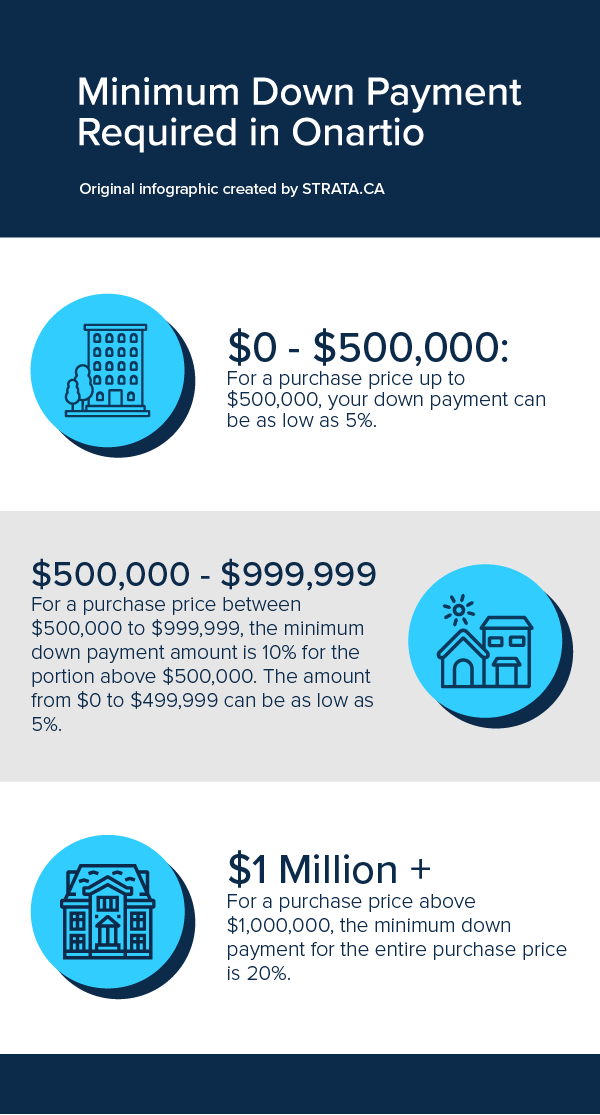Creative Ways to Save for Your Down Payment
 Written By Robert Van Rhijn — As the founder of Strata.ca, Robert is one of Ontario’s leading experts on the GTA condo market. He is also the Broker of Record at Strata.
Written By Robert Van Rhijn — As the founder of Strata.ca, Robert is one of Ontario’s leading experts on the GTA condo market. He is also the Broker of Record at Strata.Saving for a down payment can feel daunting – especially in a city like Toronto. It’s entirely possible to save up enough to purchase a home, however, as long as you’re proactive about it.
Confused about exactly how much you’ll need to save? You’re not alone. For a purchase price of up to $500,000 you can put down as little as 5%, and for homes between $500,000 and $999,999 you will have to provide a minimum of 10% on the portion over $500,000. The down payment on a home that costs over $1 million is much more steep: buyers will have to fork up 20% on the entire purchase price. This means the minimum down payment for a $400,000 home is $20,000, while a buyer will have to put down a minimum of $65,000 for a home that costs $900,000, and $400,000 for a $2 million home.

To complicate matters further, the Canada Mortgage and Housing Corporation (CMHC) also plays a role in what a buyer may choose to put down. Anyone with a high ratio mortgage (less than 20%) will have to pay insurance through CMHC, and just how much insurance will depend on the percentage of their down payment: the premium for 5% is highest, 10% is slightly lower, and 15% is even lower.
If you’re buying for the first time, you may also be able to take advantage of the Government of Canada’s First-Time Home Buyer Incentive (FTHBI). Introduced in September 2019, the incentive offers 5% of the purchase price of an existing home or 5% or 10% of the purchase price of a newly constructed home. The incentive is really more of a ‘loan’ that cuts down your monthly mortgage payments, and in return you are expected to repay the government after 25 years or when you resell your home.
In order to be eligible for the FTHBI, you must currently meet the following criteria:
- Your total annual household income must be equal to or less than $120,000
- The value of the home you plan to buy cannot be more than 4 times that of your annual household income
- Either you or your partner must be a first-time homebuyer
- You must be a Canadian citizen, permanent resident or non-permanent resident authorized to work in Canada
- You must meet the minimum down payment requirements with traditional funds (savings, withdrawal/collapse of a Registered Retirement Savings Plan (RRSP), or a non-repayable financial gift from a relative/immediate family member)
In order to make the incentive more accessible, however, the government has announced that starting Spring 2021, some of the criteria will change:
- First-time buyers with household incomes of up to $150,000 will be able to participate
- The home in question will qualify if the value is no more than 4.5 times a buyer’s annual household income
Regardless of exactly how much you need to save, the Internet has a lot of quirky ideas about how to accomplish your goal. Many of these involve acquiring a metal detector – but we’re not going to send you to any pawn shops. Instead, the following list outlines some of the more realistic routes you can take to save for a new home. It’s up to you to decide how big of a leap you’re willing to take – and just like with investments, the more extreme the method, the bigger and faster the payoff tends to be.
Light Commitment, Lower Payoff

Cancel your subscriptions: We would never advise you to cancel all of your subscriptions, but do you really need Netflix and Crave? If the answer is yes, that’s fine too. But at the very least, have a look through your bank account and determine how many monthly subscription fees you are paying – then simply eliminate the ones that matter least to you, or that you haven’t used in a while.
Sweat the small stuff: Sure, the advice is normally to not sweat the small stuff, but when you’re trying to save big, small but frequent purchases can really add up. Instead of buying daily coffees, try making your own at home (or limit your coffee shop visits to once a week); buy books used instead of new (and feel good about supporting local businesses in the process), or better yet, check them out from the library. If you don’t tend to spend much on either of these things, figure out what your specific vice is (in terms of spending), and try to cut back as much as you can.
Hack your bank account: Within your own bank account, there are a couple of optional settings you should be taking advantage of. The first is to have a portion of each of your paycheques automatically deposited into a savings account (the amount, of course, is up to you). Most major banks will also let you personalize your account to make recurring transfers from your checking account to a savings account (whether you opt to do this once, twice, or four times a month is up to you) or you can have a set dollar amount moved from one account to another every time you make a purchase with your debit card.
Don’t let your TFSA go to waste: All Canadians 18 years of age and older (and who have valid social insurance numbers) are able to open a Tax-Free Savings Account (TFSA). Many types of investments can co-mingle in your TFSA, including cash, stocks, bonds, mutual funds, and GICs. The major benefit is that growth on anything in this type of account is 100% tax free. There are maximum annual contribution limits, however, so be sure to check with your bank before making any large deposits into a TFSA.
Stick to cash: This method takes a little more self-discipline. Once a week, head over to an ATM and take out the amount you’re willing to spend that week – on everything. Then, any time you head out of the house, leave your debit and credit cards and use your cash instead for things like meals, groceries, entertainment, and even larger purchases. This will force you to become more mindful about what you’re spending, as you’ll start to see and feel your wad of cash diminish as the week comes to a close. Also, be sure to make a rule for yourself about what to do if you run out of money too early in the week (for example no purchases other than absolute necessities like groceries and transportation), as it might take some time to get the hang of this new way of life.
Give the gift of saving: If you’re saving to buy a home with a partner, skip large birthday, anniversary and Christmas gifts, and deposit the money you would have spent into a savings account instead. You can even have fun with this by writing sweet cards to each other about how excited you are to buy a home together.
Medium Commitment, Medium Payoff

Start a side hustle: Life can already feel busy, which is why this method is lower down on our list. That said, if there’s something you love to do (or that you’re particularly good at), chances are, there’s a way to monetize it. Sell your art or home cooking, restore and resell antiques, offer childcare, pet sitting or dog walking services – the options are pretty well endless here.
Change up your transportation: This is more of a commitment primarily because it involves making a significant lifestyle change. If you have two cars, size down to one; if you have one (and if it makes sense geographically), switch to biking or walking, or find someone to carpool to work with. And bonus points if getting rid of a car means not having to pay for parking, or being able to rent out your parking spot to someone else.
Big Commitment, Big Payoff

Downsize: If you don’t necessarily need all the space you currently have, consider moving to a smaller apartment in order to save on rent. This would be temporary, of course, as the end goal is to purchase a home. Reducing your rent by even $200 a month can make a huge difference in the speed at which you can save for a down payment. Better yet, you may be able to stop paying rent entirely if it’s feasible (and comfortable) to stay with relatives for a short time.
Bunk up: Have an extra bedroom that you’ve been using as an office or home gym? If you can give up that extra space for a while and rent it out to a roommate instead, you’ll be able to cut your rent right in half without having to move a muscle.
Starting your search for a new home? Click on any of these links to access active listings, sold listings or contact a Strata agent.
For any questions about this article or media inquires, please email media@strata.ca

